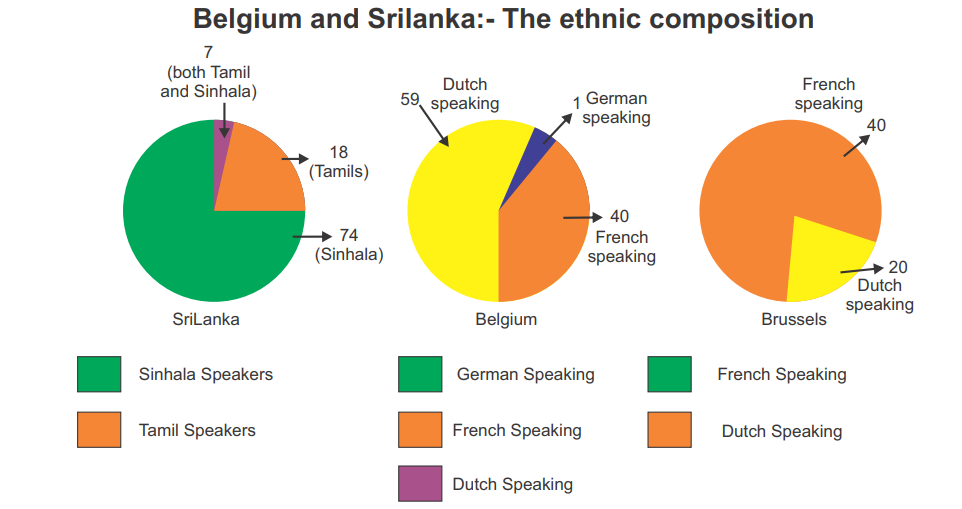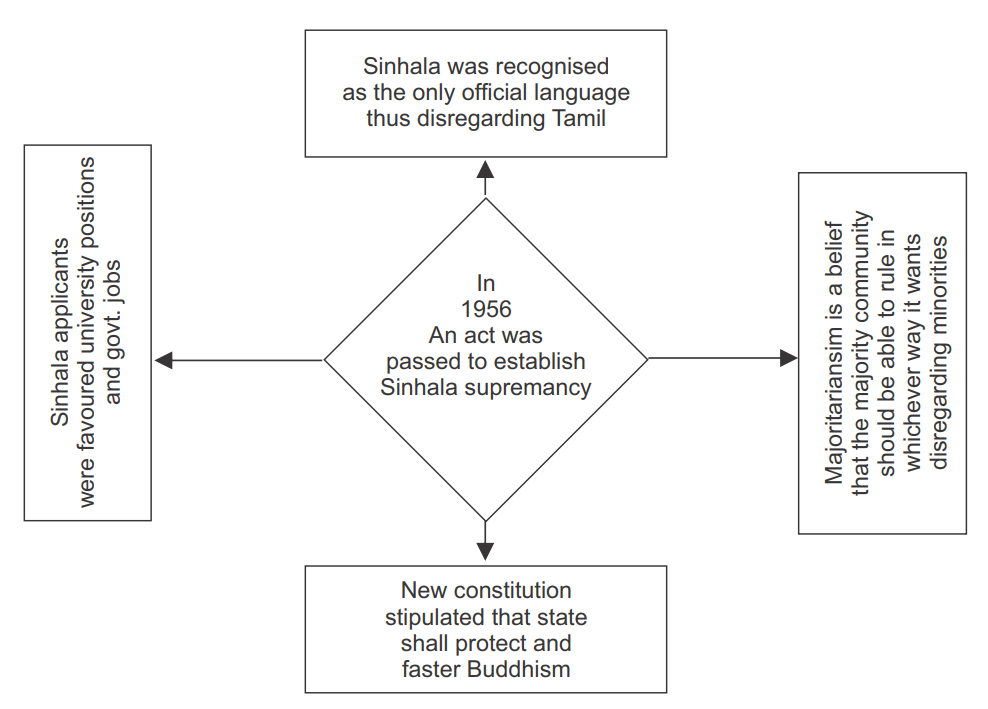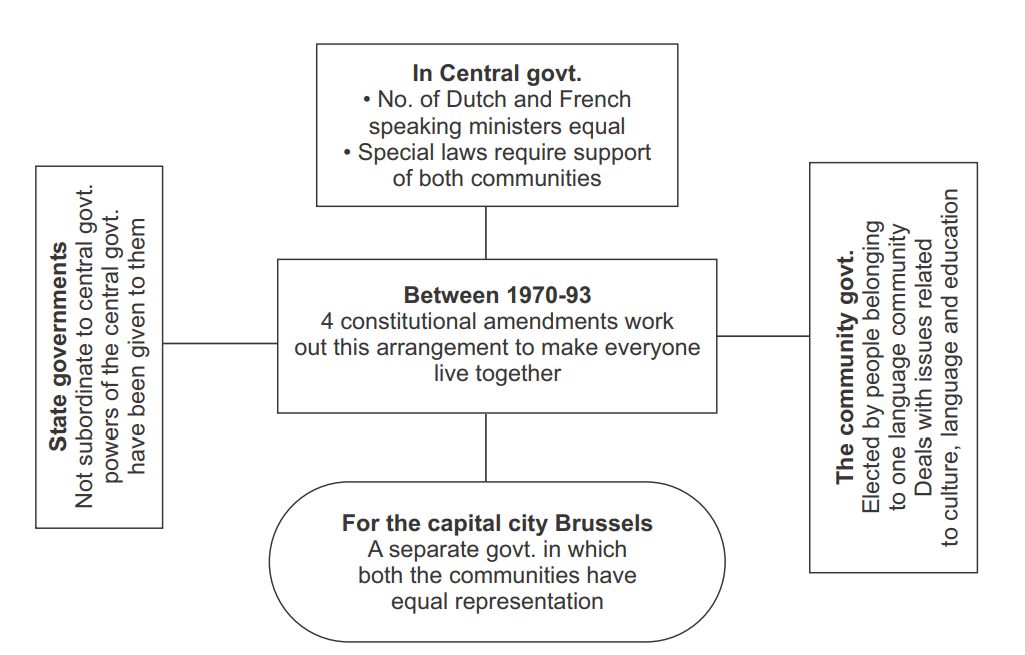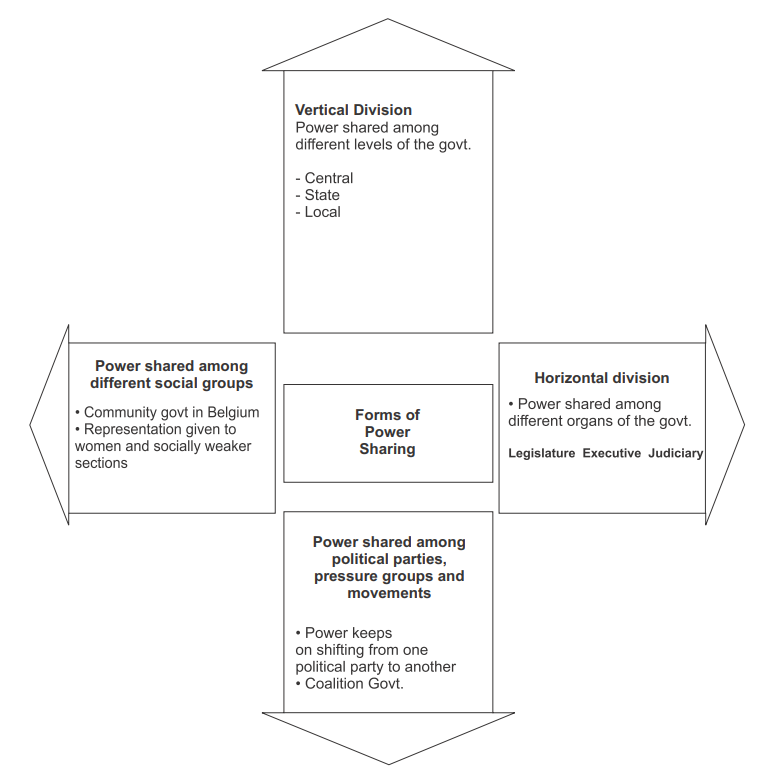Concepts
Power sharing means the distribution of power among the organs of the government such as the legislature, executive, and judiciary. Power sharing helps in achieving the stability of political order. In power-sharing, power might even be shared at distinct levels such as union, state and local.
Majoritarianism is a belief that the majority community should be able to rule a country in whichever way it wants, by disregarding the wishes and needs of the minority.
Accommodation refers to the powers sharing between the majority and minority sections of society.
The lesson illustrates, with the examples of Belgium and Sri Lanka, how power-sharing is handled by democracies and we learn how necessary it is to share power in a democracy wisely.
BELGIUM
- Geographical Position : Small country in Europe, bordered by the Netherlands, France and Germany.
- Area and Population : Smaller in area than the Indian state of Haryana. Population a little over one crore, half of the state of Haryana.
- Ethnic Composition :
- 59% live in Flemish region — speak Dutch
- 40% live in Wallonia region — speak French
- 1% speak German
- Capital : Brussels-80% speak French, 20% Speak Dutch.
- In Brussels, the Dutch-speaking people are in a minority which is the opposite of the rest of the country, where they are
- in a majority.
- The minority population of French-speaking people was richer than the Dutch-speaking people. The majority community were given benefits much later. This led to tension between the two communities in the 1950s and 1960s. Tension was more acute in the capital city of Brussels.

SRI LANKA
- Geographical Position : A small island in Asia, off the southern coast of Tamil Nadu.
- Population : Same as Haryana’s. About two crore people.
- Ethnic Composition :
- 74% Sinhalese-speaking people
- 18% Tamil-speaking people, 13% are natives of Sri Lanka, known as Sri Lankan Tamils.
- The rest are called Tamil Lankans who are descendants of plantation workers, who came from India during the colonial period.
- Religion : Most of the Sinhala-speaking people are Buddhists. Most of the Tamils are Hindus or Muslims. Christians constitute 7% of the population and they belong to both Sinhala and Tamil communities.
Majoritarianism in Sri Lanka

- Meaning of Majoritarianism : A belief that only the majority community should rule a country, make laws for everyone and with total disregard to the wishes and needs of the minority.
- Sri Lanka became independent in 1948. It immediately adopted measures to impose Sinhala supremacy.
- Examples :
- It made Sinhalese the official language of the country (by an Act in 1956), and ignored Tamil completely.
- Made a preferential policy to favour Sinhala-speaking people in all government jobs and educational institutions.
- It promoted and protected Buddhism.
- Result: The Tamils felt alienated. No respect or recognition was given to their language, culture and religion. They began a struggle for equality in jobs, entry to the university, recognition of their language and culture. Slowly the conflict changed into a demand for regional autonomy. The Tamilians were grouped together in the North and East of Sri Lanka. Their demands were ignored, the conflict became more severe and by the 1980s, the Tamilian demand had changed. They wanted TAMIL EELAM in the North and East. A civil war ensued, which killed thousands on both sides. The flourishing economy of Sri Lanka has disappeared and the conflict has given a blow to social, cultural and economic life of Sri Lanka.
Accommodation in Belgium

- Belgium, unlike Sri Lanka, has taken a totally different stand. It amended the Constitution to accommodate every ethnic community, with the result that it did not suffer from a civil war, demands for autonomy or partition of the country.
Why is Power-Sharing Desirable?
- Power sharing is a must in a democracy.
- There are two sets of reasons which make power-sharing desirable.
| Prudential | Moral |
|
|
|
|
|
|
|
|
Forms of power sharing

- Power is shared among different organs of government, such as the
- Legislature,
- Executive and
- Judiciary.
- Power can be shared among governments at different levels
a)- Central or Union Government
- State Governments
b)Power can be shared at local levels
-
- Municipality and Panchayat. Level
(Local Self Government)
The entire country is usually called federal government.
- Municipality and Panchayat. Level
- Different social groups, such as the religious and linguistic groups : such as Belgium & Lebanon.
- Social Movement: Force to Government to change law- Dowry, Child Marriage etc.
- Pressure Group: Influence the Government and force them to change the policies.
Farmers, Workers, Industrialists. - Political Parties
- Lead to Competition - ensures that power does not remain in one hand.
- Coalition of government formed , if any party fails to get majority.
- Parties have to perform to remain in power.
Questions & Answers
Q.1. What are the different forms of power-sharing in modern democracies? Give an example of each of these.
Ans. In modern democracies, the different forms of power sharing are given below with an example of each :
(1)Power sharing in different form of government
- Power sharing among different organs of government such as the legislature, executive and judiciary.
- It is called horizontal distribution pf power
- For example, in India Parliament enacts laws. Executive executes or implements them and judiciary checks the functioning of executive or laws made by the leg statures.
(2) Power sharing among governments at different levels :
- There are governments at the National, State and Local levels.
- Powers are divided among these governments. For example in India, there is a division of powers between Center and the States. There are three lists i.e., Union list, State list and Concurrent list. The residuary powers which have not been included in the three lists are with the Central Government.
(3) Power sharing among different social groups :
- Sometimes religious and linguistic groups too share power as is the case in Belgium where there is a “community government” which is elected by people belonging to one language community no matter where they live.
- Such government enjoys power regarding cultural, educational and language related issues.
(4) Power sharing among political parties, pressure groups and movements : In a democracy political parties, pressure groups and movements control or influence those in power. Sometimes power is shared by different political parties having different ideologies. Such alliances form coalition government.
Q.2. State one prudential reason and one moral reason for power-sharing with an example from the Indian context. [CBSE Sept. 2010]
Ans.
(i) (a) India is a multicultural society.
(b) India is a democratic country.
Q.3. After reading this chapter, three students drew different conclusions. Which of these do you agree with and why ? Give your reasons in about 50 words.
- Thomman – Power sharing is necessary only in societies which have religious, linguistic or ethnic divisions.
- Mattai – Power sharing is suited only for big countries that have regional divisions.
- Ousep – Every society needs some form of power sharing even if they are small or do not have social divisions.
Ans.
The conclusion drawn by Ouseph is correct. Every society needs some form of power-sharing even if it is small or does not have social divisions because power-sharing helps to reduce the possibility of conflicts among individuals too. For example, there may be a difference of opinion among the members of a joint family. Such differences may be resolved if responsibilities and powers are divided among the members of the family. Similar is the case in societies and governments. Thus there should be power-sharing in small or big societies or countries.
If there are different communities in a country they should try to accommodate each other as has been done in Belgium – where the French-speaking people accepted equal representation in Brussels because the Dutch-speaking community has accepted equal representation in the central government.
Q.4. The Mayor of Merchtem, a town near Brussels in Belgium, has defended a ban on speaking French in the town’s schools. He said that the ban would help all non¬Dutch speakers integrate in this Flemish town. Do you think that this measure is in keeping with the spirit of Belgium’s power sharing arrangements ? Give your reasons in about 50 words.
Ans. The ban on speaking French in the town’s schools in Merchtem is not in keeping with the spirit of Belgium’s power-sharing arrangements because this is a Flemish town. Dutch is spoken by the people in this region. The ban is an example of the imposition of the will of the majority on the minority which is against the principle of accommodation under which the Belgian leaders recognised the existence of regional differences and cultural diversities. However, they amended their constitution to work out an arrangement that would enable everyone to live together within the country. On the other hand, the ban on speaking French may result in strained relations between French-speaking and Dutch-speaking communities.
Multiple Choice Questions
Previous Year’s Questions
1. Choose the correct option : [CBSE (CCE) 2011]
Power sharing is desirable because it helps :
(a) To increase pressure on government.
(b) To reduce possibilities of conflicts.
(c) To generate awareness among people.
(d) To increase percentage of voters.
2. Which major social group constituted the largest share in population of Sri Lanka? [CBSE (CCE) 2011]
(a) Sinhalas
(b) Sri Lankan Tamils
(c) Indian Tamils
(d) Muslims
3. Which of the following is an example of horizontal sharing of power? [CBSE (CCE) 2011]
(a) Power sharing between different states.
(b) Power sharing between different organs of the government.
(c) Power sharing between different levels of the government.
(d) Power sharing between different political parties.
4. Which of the following statements is NOT true? [CBSE (CCE) 2011]
(a) In Belgium, leaders realised that unity of the country is possible only by sharing power.
(b) In Sri Lanka, the majority community wants to force domination over others.
(c) In Sri Lanka, the demand for more autonomy to provinces populated by Tamils has been granted.
(d) Division of Belgium along linguistic lines was averted due to power sharing.
5. Who elects the communist government in Belgium? [CBSE (CCE) 2011]
(a) People belonging to one language community only.
(b) By the leader of Belgium.
(c) The citizens of the whole country.
(d) The community leaders of Belgium.
NCERT Questions
6. Consider the following statements about power sharing arrangements in Belgium and Sri Lanka :
A. In Belgium the Dutch-speaking majority people tried to impose their domination on the minority French speaking community.
B. In Sri Lanka the policies of government ensured the dominance of the Sinhala speaking majority.
C. The Tamils in Sri Lanka demanded a federal arrangement of power sharingto protect their culture, language and equality of opportunity in education and jobs.
D. The transformation of Belgium from unitary government to a federal one prevented a possible division of the country on linguistic lines.
Which of the statements given are correct ?
(a) A, B, C and D
(b) A, B, and D
(c) C and D
(d) B, C and D
7. Match List I (forms of powe- sharing) with List II (forms of government) and select the correct answer using codes given below the lists :
| List I | List II |
| (i) Power shared among different organs of government | A. Community government |
| (ii) Power shared among governments at different levels | B. Separation of Powers |
| (iii) Power shared by different social groups | C. Coalition government |
| (iv) Power shared by two or more political parties | D. Federal government |
(a) (i) – D, (ii) – A, (iii) – B, (iv) – C
(b) (i) – B, (ii) – C, (iii) – D, (iv) – A
(c) (i) – B, (ii) – D, (iii) – A, (iv) – C
(d) (i) – C, (ii) – D, (iii) – A, (iv) – B
Additional Questions
8. The Community Government signifies:
(a) The powers of government regarding community development.
(b) The powers of the government regarding law making for the community.
(c) The powers of the government regarding cultural, educational and language related issues.
(d) The government enjoys privileges to safeguard the interest of a particular community.
9. System of ‘checks and balances’ means:
(a) Horizontal distribution of powers.
(b) Separation of powers.
(c) Put a check on the exercise of unlimited powers of the organs of government by maintaining a balance of power among various institutions.
(d) Federal division of powers.
10. A belief that the majority community should be able to rule a country in whichever way it wants is
(a) Community Government
(b) Federal Government
(c) Majoritarian
(d) Prudential
11. Power sharing is :
(a) the very spirit of democracy.
(b) separation of powers at different levels.
(c) system of checks and balances.
(d) a type of balancing powers.
12. Vertical division of power is :
(a) a system in which each organ of government checks the others.
(b) a type of distribution in which power is shared among different organs of government.
(c) a type of distribution of power which involves the higher and lower levels of government.
(d) a type of government elected by people.
13. Coalition government is the government:
(a) based on prudential and moral reasons.
(b) government of the majority community.
(c) the government elected by the people.
(d) an alliance government formed by two or more parties, if no single party gets a majority in the election.
14. The word ‘ethnic’ signifies :
(a) different religions.
(b) social division on shared culture.
(c) a violent conflict between opposite groups.
(d) a careful calculation of gains and losses.
15. Which are the important features of prudential reason ?
(i) Emphasises intrinsic worth of power sharing.
(ii) Based on careful calculation of gains or losses.
(iii) Based on moral consideration.
(iv) Stresses on beneficial consequences.
(a) (ii) and (iii)
(b) (i) and (iv)
(c) (ii) and (iv)
(d) (i) and (iii)
16. Which statement justifies the ethnic complexity of Sri Lanka?
(a) Sinhalese – 80%, Tamils – 20%
(b) Sinhalese – 60%, Tamils – 40%
(c) Sinhalese – 74%, Tamils – 18%
(d) Sinhalese – 76%, Tamils – 18%
17. Consider the statements on Ethnic composition :
(a) The Ethnic composition of Belgium is very complex because of diverse language speaking people like Dutch speaking, French speaking and German speaking.
(b) French speaking community was in minority and more powerful.
(c) Dutch speaking community was in majority and less powerful.
(d) There was conflict between the French and the Dutch communities.
18. Prudential reasons of power sharing stresses on:
(a) The stability of political order.
(b) To reduce the possibility of conflict between social group.
(c) A fair chance/share to minority.
(d) All the above.
19. The majority of population in Brussels, the capital city of Belgium speaks :
(a) French
(b) Dutch
(c) German
(d) Roman
20. The proportion of Tamils in Sri Lanka’s total population is about:
(a) 8 percent
(b) 18 percent
(c) 28 percent
(d) 38 percent
21. In India, power sharing mechanism does not directly involve:
(a) Judiciary
(b) Legislature
(c) Executive
(d) Industry
22. Power sharing does not:
(a) accommodate diversities.
(b) speed up the decision making process.
(c) increases conflict among different commuriities.
(d) All the above.
23. Coalition Government implies :
(a) power sharing among different organs of the government.
(b) power sharing by different communities.
(c) power sharing by two or more political parties.
(d) power sharing within the government at different levels.
24. The religion of state in Sri Lanka is :
(a) Buddhism
(b) Christianity
(c) Hinduism
(d) Islam.
25. A strategy under which all the major segments of the society are provided with a permanent share of power in the governance of the country is known as:
(a) secularism
(b) power sharing
(c) majoritarianism
(d) minoritism.
26. The majority of the population in Belgium lives in:
(a) Wallonia region and speaks French
(b) Wallonia region and speaks Dutch
(c) Flemish region and speaks Dutch
(d) Flemish region and speaks French
27. Belgium successfully solved its problem by :
(a) rejecting the policy of majoritarianism.
(b) developing a power sharing mechanism.
(c) respecting the interest of different communities.
(d) All the above.
28. The power of different levels of government shows:
(a) separation of powers.
(b) community Government.
(c) coalition Government.
(d) the federal division of power.
29. Match the following :
A. Ethnic Composition (i) A violent conflict between opposite groups within a country.
B. Majoritarianism (ii) Based on prudence, i.e., a careful calculation of gains or losses.
C. Civil War (iii) A social division based on shared culture.
D. Prudential reason (iv) A belief that the majority community should be able to rule a country.
E. Vertical division (v) Power is shared among power different organs of the government.
F. Horizontal (vi) Power is involved in the division of the higher and lower power levels of government.
(a) A – (iv), B – (iii), C – (ii), D – (i), E – (v), F – (vi)
(b) A – (iii), B – (iv), C – (i), D – (ii), E – (vi), F – (v)
(c) A – (i), B – (ii), C – (iii), D – (iv), E – (v), F – (vi)
(d) A – (ii), B – (iv), C – (iv), D – (v), E – (vi), F – (i)
30. Consider the following two statements on power-sharing and select the answer using codes given below:
A. Power sharing is good for democracy.
B. It helps to reduce the possibility of conflict between social groups.
Which of the statements are true and false?
(a) A is true but B is false
(b) Both A and B are true
(c) Both A and B are false
(d) A is false but B is true.
31. Indicate true and false for given statements and give valid reasons:
(a) In Belgium, the Dutch speaking majority people tried to impose their domination on the minority French speaking community.
(b) In Sri Lanka, the policies of the government sought to ensure the domination of the Sinhala speaking majority.
(c) The Transformation of Belgium from a unitary government to a federal one presented possible division of the country on linguistic lines.
(d) The Tamils in Sri Lanka demanded a federal arrangement of power to protect their culture, language, and equality of opportunity in education and jobs.
Answer:
(a) False – because French people tried to impose their domination.
(b) True – As Sri Lanka followed the majoritarian concept.
(c) False – But it helped in power-sharing on linguistic lines.
(d) True – As Tamils were alienated from the mainstream of power-sharing.

